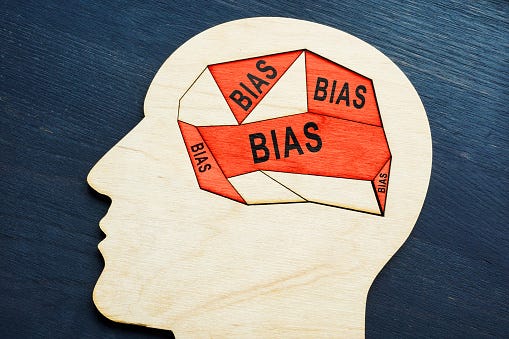Unconscious Bias: Can you read my mind?
Unconscious biases are kind of like really honest politicians. We know there’s probably one or two out there, but it sure is hard to tell.
But let’s define the term first. The Oxford dictionary defines bias as “prejudice in favor of or against one thing, person, or group compared with another, usually in a way considered to be unfair.”
If someone is unconscious of their own bias, then it would be fair to say that they are unaware that they are doing this.
So what would suggest that someone might have an unconscious bias? Well, to the outside world, it would be someone’s actions or speech. Except, to arrive at the conclusion that subconscious bias is at play, this other entity would not only need to be a mind-reader, but it would need to do a step better. That other entity (aka, person) would need to know someone else’s mind better than that other person does.
How else would they know that there is indeed unconscious bias at play rather than a projection or assumption?
Now I’m certainly not suggesting that we don’t have biases that we might need to reflect on from time to time, but no one can determine what’s in our own mind but us.
The trouble with some of the training around this sort of thing is that you’ll be told that you have certain unconscious biases, perhaps based on some sort of test, or just a general consensus — and then you’re taught that you must address it. First of all, you can’t really argue that you don’t have it, since after all…it’s unconscious. And secondly, it causes hyper-attention to whatever that apparent bias might be, which often results in more tense and inauthentic interactions between colleagues, acquaintances and even friends.
Again, there’s nothing wrong with considering your own behavior and thinking about what might cause you to respond in the ways you do and whether biases do, in fact, play a role. I’ve certainly overcome some of my own and a work-in-progress on several fronts. As a human being, I strive to treat others as fairly as possible and overcome any limitations I might have on that front.
The trouble, at least in my view (which is why you’re here, yes?), is when others make these assumptions and generalizations on behalf of others, seeking to enforce them. The problem comes into play when someone begins a conversation with “well, as a white person, you’ve been conditioned to believe that Black people are…” or “because of unconscious bias you’re less likely to hire someone with a foreign sounding last name or pay a woman the same as a man” when none of that is necessarily true.
Often, in mandatory training sessions people feel silenced rather than empowered to explore—especially since such sessions are usually hosted by their employers. These employers, by the way, don’t necessarily host them out of the goodness of their heart either, but rather as a strategy to protect themselves from lawsuits.
I’ve tried to find some statistics to see the results of training around unconscious bias. I couldn’t find anything concrete. But maybe that’s just my poor research skills and lack of time at the moment. Still, if the impact is significant and measurable, I’d imagine it would be front-and-center?
What I do know is that this kind of training has become highly lucrative. So much so that the Diversity and Inclusion market spend was an estimated at US$9.3 Billion in the year 2022 alone.
However, perhaps the problem isn’t the message, but rather the messengers? Maybe with some fine-tuning there’s better ways to address unconscious bias—approaching it through discovery and rhetoric, rather than assumptions, accusations, and shame. After all, don’t we want to act and react from a place of truth? For that, we must seek to eliminate bias…though we will always live with some.
What are your thoughts? My favorite part is hearing them. As always, leave a comment below.
Thank you for keeping me company and supporting this Substack through a paid subscription. Got ideas for future posts or member-only content? Email me.
Not subscribed yet? Although I try to make many posts public and available for free access, to ensure sustainability and future growth—if you can—please consider becoming a paid subscriber. In addition to supporting my work, it will also give you access to an archive of member-only posts. Please also share, like, and comment.




"Perhaps the problem isn't the message, but rather the messengers" sums up this piece for me. What people do with the knowledge about unconscious bias that reinforces inequality rather than remove barriers to fair and equitable treatment of all (and making billions within the industry that may not actually promote beneficial change) is the issue. Thank you for another thoughtful exploration of a hot topic!